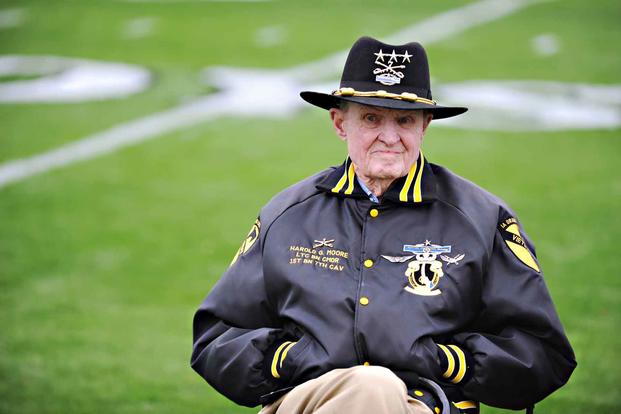Fort Benning, Georgia, was redesignated as Fort Moore on Thursday, the new name honoring one of the Army's most influential couples.
Fort Moore is the center of the Army's training for new ground combat troops, hosting the basic training schools for infantry, cavalry scouts and tankers. It was renamed after Lt. Gen. Hal Moore and his wife Julia Moore.
The move is part of the Pentagon's ongoing effort to scrub all installations of names honoring Confederates who waged war against the U.S. Fort Moore is one of nine Army bases being renamed. All of the new names honor service members and their families, with the exception of Fort Bragg, North Carolina, which is set to be redesignated Fort Liberty on June 2.
Read Next: Inside One of the Army's Most Chaotic Brigades
Lt. Gen. Moore, a Korean and Vietnam War veteran, is best known for commanding 1st Battalion, 7th Cavalry Regiment, in the legendary Battle of Ia Drang Valley in 1965, which was among the first major engagements of the Vietnam War. The battle was immortalized in the book and movie "We Were Soldiers," and saw the first major use of contemporary air assault tactics, including soldiers being swiftly inserted into battle and the wounded being rescued with helicopters.
The battle set the blueprint for tactics for both sides of the conflict, with the U.S. relying on its air superiority and artillery power and Vietnamese forces seeking to engage Americans at close distances to neutralize that advantage.
The five-day battle led to heavy casualties, with 237 Americans killed and roughly that many wounded. In the aftermath of the battle, Julia Moore pushed for the Army to relook at how it notifies families of battlefield fatalities. Until then, the service would notify families through a telegram, often delivered by a taxi driver.
Julia Moore's lobbying on the issue spurred the force to build a better support network for families, that included fatality notifications to be delivered by a soldier wearing a dress uniform, often from that unit and accompanied by a chaplain, a procedure still in use today. She was also a regular volunteer at the Red Cross and worked at on-base day care centers and hospitals while her husband served. She died in 2004 and was buried at the Fort Moore cemetery. Lt. Gen. Moore is also buried there; he died in 2017.
Fort Moore was originally named after Henry Benning, a Confederate general who was a key player in the South's bid to break away from the Union, waging war against the U.S. largely to preserve the slave trade.
"What was the reason that induced Georgia to take the step of secession? This reason may be summed up in one single proposition. It was a conviction, a deep conviction on the part of Georgia, that a separation from the North was the only thing that could prevent the abolition of her slavery," Benning said in an 1861 speech. "If things are allowed to go on as they are, it is certain that slavery is to be abolished. By the time the North shall have attained the power, the black race will be in a large majority, and then we will have black governors, black legislatures, black juries, black everything."
Lt. Gen. Moore is broadly seen as a trailblazer for equal opportunity in the ranks, at a time when the Army was integrating Black soldiers into what had been exclusively white units. After the Vietnam War, Moore commanded the 7th Infantry Division in South Korea. There, he crafted what was generally considered a precursor to the Army's equal opportunity policy.
"Early on, it was clear to me that many of the race relations problems and perceptions and real cases of discrimination occurred at the small-unit level," Moore said, according to the 2013 biography 'Hal Moore: A Soldier Once … and Always.' "As I checked into that, the other small-unit leadership deficiencies came to light."
Moore went on to establish courses for noncommissioned officers in his division to instill values that soldiers should be treated with dignity, and that taking care of troops is key to an effective fighting force. Those courses were a precursor to the Army's Basic Leader Course, a required three-week course for new NCOs that largely centers on Army personnel policy.
In the 1970s, Moore oversaw Army personnel policy and implemented the service's first major equal opportunity policies. This included having soldiers from racial minority groups serve on officer selection boards, efforts to recruit more Black officers, and various race-relations training programs.
"Each man must be continually provided fair treatment and equal opportunity, within appropriate regulations, to rise to as high a level of responsibility as his talent and diligence will take him," a memo he wrote in the early 1970s said.
-- Steve Beynon can be reached at Steve.Beynon@military.com. Follow him on Twitter @StevenBeynon.
Related: Fort Hood Gets a New Name Honoring a Texas-Born Four-Star General











